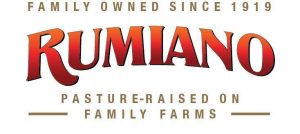Rumiano Cheese Commits to Carbon Neutrality by 2030
 Rumiano Cheese Company, California’s oldest family-owned cheese company, has committed to achieve carbon neutrality by 2030. As a first step, Rumiano has introduced a climate impact program to accelerate efforts to improve the sustainability of its supply chain.
Rumiano Cheese Company, California’s oldest family-owned cheese company, has committed to achieve carbon neutrality by 2030. As a first step, Rumiano has introduced a climate impact program to accelerate efforts to improve the sustainability of its supply chain.
Rumiano has partnered with the CDIC, a coalition of California dairy producers, processors, major universities and the California Dairy Research Foundation, created to collaboratively drive dairy innovation and productivity. Established by the California Milk Advisory Board, the CDIC supports industry innovation through grants, internships, research projects and educational training.
With support from the CDIC’s Dairy Business Innovation Initiative, Rumiano has hired its first sustainability impact intern to assess the company’s entire ecological footprint. Cal Poly Humboldt environmental science major Ellie Frazier has spent two months collecting and documenting comprehensive baseline measurements on all business activities that contribute to energy and water consumption, resource usage and carbon emissions.
With baseline data in place, Frazier has entered the second stage of her research where she is analyzing areas of the business that have the greatest opportunities for optimization and environmental outcomes. Frazier’s research has already identified a number of climate impacting opportunities around transportation and sustainable packaging and she will be exploring additional ways Rumiano can further reduce emissions by decreasing miles traveled of raw materials and finished goods.
This collaboration with the CDIC builds on Rumiano’s long commitment to advancing sustainable farming and production practices and a record of innovation. Rumiano has already made significant investments in sustainability on several fronts.
Ambitious initiatives range from its zero-waste cheese manufacturing plant that recycles and repurposes everything from cardboard and plastic to whey and wastewater, to the company’s in-house wastewater treatment facility that biologically treats 20,000 gallons of cheese production wastewater per day. This process not only prevents 99 percent of milk solids from entering the environment through groundwater and rivers, it enables the water to become potable and usable for its community and puts clean water and food grade compost equivalents back into the land.
Last year, Rumiano opened an energy-efficient 46,766-square-foot state-of-the-art cheese packaging plant in Willows, Calif., that will soon run on 100 percent renewable solar energy generated on-site like the company’s existing facilities.
“As we work toward our long-range sustainability action plans, we are committed to continuous progress across the entire supply chain. We know that over time, small changes in our farming, manufacturing and packaging processes will lead to big transformations. But the greatest impact on the health of our planet will lie in our collective ability to make pasture-based, regenerative farming practices more affordable and accessible to all farms,” said Joe Baird, Rumiano Cheese Company’s CEO. “Regenerative agriculture promotes healthier soils that absorb more carbon into the ground and keep more greenhouse gasses from the atmosphere.”
“Progress relies on innovation and collaboration,” said Veronique Lagrange, director of the CDIC, “We value our partnership with processors like Rumiano and are pleased to offer support through the Dairy Business Innovation Initiative to help them achieve their business objectives.”
October brings Gourmet News’s Fall Cheese Guide, in addition to our monthly issue. Subscribe now so you won’t miss them!






